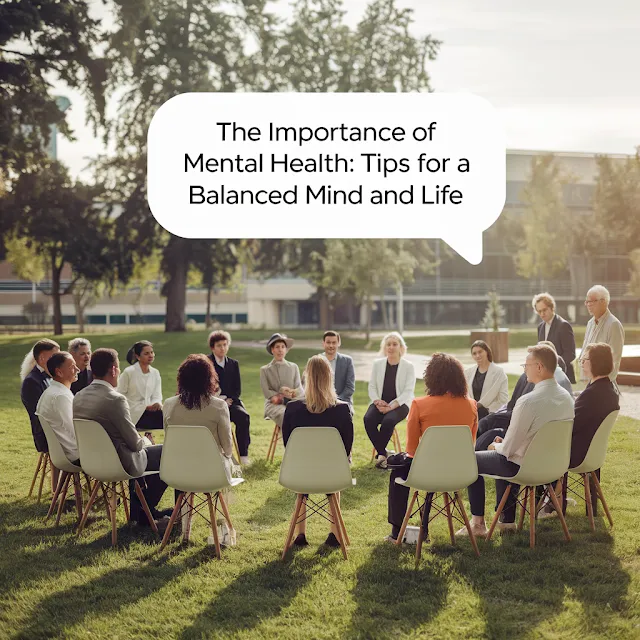The Importance of Mental Vitality: Tips for a Balanced Mind and Life
Introduction:
Mental health is an
essential aspect of overall well-being, yet it is often neglected in today’s
fast-paced world. Just as we take care of our physical health, nurturing our
mental health is vital for living a fulfilling, balanced life. Whether you're
facing stress, anxiety, or depression, focusing on your mental well-being can
improve your mood, relationships, and quality of life. In this article, we will
explore the importance of mental health, common challenges, and practical
strategies for maintaining a healthy mind.
What is Mental Health?
Mental health refers to
our emotional, psychological, and social well-being. It influences how we
think, feel, and act in our daily lives, affecting everything from how we
handle stress to how we relate to others. Good mental health allows us to cope
with life’s challenges, build strong relationships, and make sound decisions.
Mental health is not
static—it can fluctuate throughout our lives. Various factors, such as life
events, work pressures, relationships, or even genetics, can impact our mental
health. Recognizing the importance of mental well-being and actively nurturing
it is key to leading a balanced life.
Why Mental Health Matters
1.
Improves
Emotional Resilience: A healthy mind helps
you manage emotions effectively, enabling you to bounce back from setbacks and
adapt to changes with ease.
2.
Enhances
Relationships: Positive mental health
fosters better communication, empathy, and understanding in relationships,
improving your connection with family, friends, and colleagues.
3.
Boosts
Productivity: When your mind is in a
good place, you are more focused, creative, and motivated, which leads to
increased productivity and better performance at work or school.
4.
Reduces
Stress and Anxiety: Prioritizing mental
health can reduce feelings of stress and anxiety. By managing your mental
well-being, you’re better equipped to handle life’s pressures.
5.
Promotes
Physical Health: Mental health is
closely linked to physical health. Stress and mental health disorders can
weaken the immune system, disrupt sleep, and increase the risk of chronic
conditions like heart disease. Taking care of your mental health promotes
better overall well-being.
Common Mental Health Challenges
1.
Stress: Stress is a natural part of life, but when it
becomes overwhelming, it can negatively impact mental health. Long-term stress
can lead to burnout, anxiety, and even depression if not managed properly.
2.
Anxiety: Anxiety is a feeling of worry, nervousness, or
fear that can be mild or severe. While occasional anxiety is normal, chronic
anxiety can interfere with daily activities and mental well-being.
3.
Depression: Depression is more than just feeling sad; it’s
a serious mental health condition that affects mood, energy levels, and overall
outlook on life. Seeking help and treatment for depression is crucial to
recovery.
4.
Burnout: Burnout occurs when you feel emotionally,
physically, and mentally exhausted due to prolonged stress, often related to
work or caregiving. It can result in feelings of detachment, cynicism, and
decreased performance.
Practical Tips for Maintaining Mental Health
1. Practice Mindfulness and Meditation
Mindfulness is the
practice of focusing on the present moment without judgment. Meditation is a
tool that helps you cultivate mindfulness, reduce stress, and promote emotional
well-being. Setting aside a few minutes each day for meditation or deep
breathing exercises can help you clear your mind and reduce anxiety.
2. Stay Physically Active
Physical exercise is not
only beneficial for the body but also for the mind. Regular exercise releases
endorphins, the body’s natural mood enhancers. Activities like walking, yoga,
or even dancing can help reduce stress and improve your mental health.
3. Maintain a Healthy Diet
Nutrition plays a
significant role in mental health. A balanced diet rich in fruits, vegetables,
whole grains, and lean proteins provides the nutrients needed for brain
function. Avoid excessive sugar, caffeine, and processed foods, which can
negatively impact mood and energy levels.
4. Stay Connected with Loved Ones
Maintaining strong
social connections is key to mental well-being. Talking with friends or family,
sharing your thoughts, and spending time with loved ones can provide emotional
support and help alleviate feelings of loneliness or isolation.
5. Get Enough Sleep
Sleep is crucial for
mental health. Poor sleep can exacerbate stress, anxiety, and depression. Aim
for 7-9 hours of quality sleep per night, and establish a bedtime routine to
promote restful sleep.
6. Set Realistic Goals
Setting small,
achievable goals can give you a sense of accomplishment and purpose. Break
larger tasks into smaller steps, and celebrate your progress along the way.
This can help reduce feelings of overwhelm and boost self-esteem.
7. Limit Screen Time
Constant exposure to
social media, news, and work emails can contribute to feelings of stress and
anxiety. Setting boundaries around screen time and taking digital detoxes can
help you relax and recharge.
8. Seek Professional Help When Needed
It’s important to
recognize when you need professional support. If you’re struggling with
persistent stress, anxiety, or depression, seeking help from a therapist,
counselor, or mental health professional can provide the guidance and support
you need to recover.
Breaking the Stigma Around Mental Health
One of the major
barriers to good mental health is the stigma associated with mental health
issues. Many people feel embarrassed or ashamed to seek help, but mental health
is just as important as physical health. Talking openly about mental health,
breaking down misconceptions, and supporting others in their mental health
journeys can help create a more accepting and understanding society.
Conclusion
Your mental health is a
vital part of your overall well-being, influencing how you think, feel, and act
every day. By incorporating healthy habits like mindfulness, regular exercise,
a balanced diet, and strong social connections, you can support your mental
well-being and live a more balanced, fulfilling life.
Don’t wait until you’re
feeling overwhelmed—start prioritizing your mental health today. Remember, it's
okay to seek help when you need it, and taking small steps each day can make a
big difference in your emotional and mental resilience. Take care of your mind,
and it will take care of you!
React to this post:
mental health, psychologist near me, bipolar disorder, better help therapy, schizophrenia, depression, borderline personality disorder, mental health therapist near me, mental health services, signs of depression, anxiety, mental health counselor, mental health facilities near me, clinical depression, mental health near me, psychiatry near me, mental health help, bipolar depression, dual diagnosis treatment centers, family therapy near me, mental health services near me, psychotherapist, major depressive disorder, anxiety attack, hers mental health












0 comments:
Post a Comment